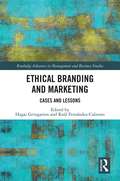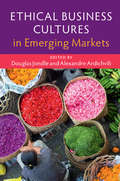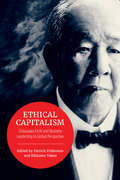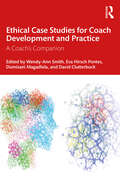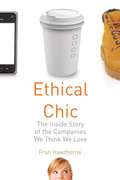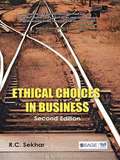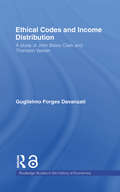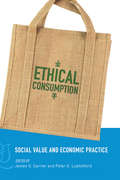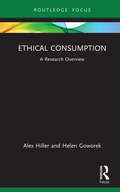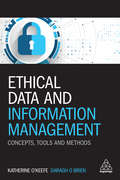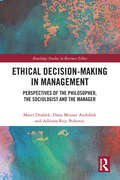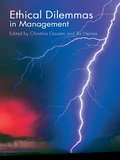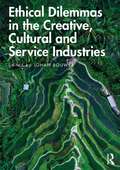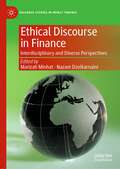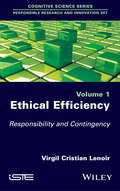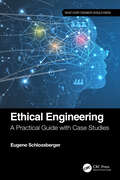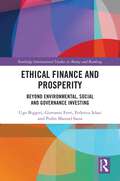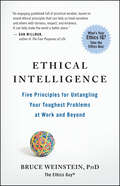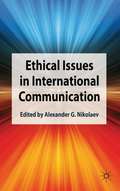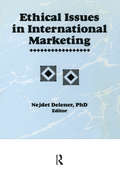- Table View
- List View
Ethical Branding and Marketing: Cases and Lessons (Routledge Advances in Management and Business Studies)
by Hagai Gringarten Raúl Fernández-CalienesEthical Branding and Marketing: Cases and Lessons provides current perspectives on fascinating global cases focusing on the specific combination of the two fields of "ethics" and "branding," on their relationship, and on how that joint perspective shapes brands, companies, business strategies, and the market itself. In a contemporary environment of "truthiness" and fake news, it is more important than ever to review core principles of ethics and to reassess how these principles apply to today’s branding and marketing practices. This book addresses practices in ethical branding and corporate culture. It includes such topics as truth, integrity, value, vulnerability, and differentiation. Collectively, these cases provide a contemporary overview of intriguing scenarios and best practices in ethical branding. The book provides the reader with real, updated insight into ethical decision making; helps students integrate ethics, branding strategy, and real life, complex situations into an effective learning process; and provides the reader with up-to-date ethical branding cases from around the world.
Ethical Business Cultures in Emerging Markets
by Alexandre Ardichvili Jondle DouglasPrevious research on corporate cultures and ethical business cultures has focused almost exclusively on studies of multinational corporations from a handful of developed countries. This book addresses the intersection of human resource development and human resource management with ethical business cultures in the four BRIC countries, and four other fast-growing emerging economies: those of Mexico, Indonesia, South Africa and Turkey. Drawing on longitudinal large-scale survey-based studies, it compares managers' and employees' perceptions of ethical business cultures in these countries, contrasting them with the US economy. It then discusses the economic and socio-cultural context and current research on business ethics in each of these countries, including implications for research and practice. This significant study will appeal to scholars, researchers and students in business ethics, management, human resource management and development, and organization studies, and addresses issues faced daily by business executives and practitioners working in emerging market countries.
Ethical Capitalism: Shibusawa Eiichi and Business Leadership in Global Perspective
by Kikkawa Takeo Patrick FridensonShibusawa Eiichi (1840–1931) was a Japanese banker and industrialist who spearheaded the modernization of Japanese industry and finance during the Meji Restoration. He founded the first modern bank in Japan and his reforms introduced double entry accounting and joint-stock corporations to the Japanese economy. Today, he is known as the “father of Japanese capitalism.” Ethical Capitalism is a volume of essays that tackles the thought, work, and legacy of Shibusawa Eiichi and offers international comparisons with the Japanese experience. Eiichi advocated for gapponshugi, a principle that emphasized developing the right business, with the right people, in service to the public good. The contributors build a historical perspective on morality and ethics in the business world that, unlike corporate social responsibility, concentrates on the morality inside firms, industries, and private-public partnerships. Ethical Capitalism is not only a timely work; it is a necessary work, in a rapidly globalizing world where deregulation and lack of oversight risk repeating the financial, environmental, and social catastrophes of the past.
Ethical Case Studies for Coach Development and Practice: A Coach's Companion
by Wendy-Ann Smith, Eva Hirsch Pontes, Dumisani Magadlela, and David ClutterbuckProviding both a depth and breadth of examples of ethical dilemmas which coaches may face as part of their practice, this book is the first comprehensive handbook of case studies in the field, supporting coaches in developing their ethical awareness and competence. The world of coaching has become increasingly complex over the past two decades. While the professional bodies have all released codes of conduct or ethical guidelines, these at best deal with general principles and serve as a point of reference for reflection. Ethical Case Studies for Coach Development and Practice is an essential accompaniment for coaches. Written by seasoned practitioners, this companion coaching case study book offers a more personal perspective on ethics in practice. Its simple structured layout and focus on ethical dilemmas make it an attractive course supplementary text and resource for practitioners. Divided into two sections, the guide explores the following themes: ethical development, coach education, one-to-one coaching, individual and group supervision, team coaching, external coaching assignments, internal coaching, digital and AI coaching, power in coaching, and the promotion of coaching.This book is a vital resource for coaches at all levels of experience in their professional coach journey, and for those with more experience in the development of ethical thinking and practice such as supervisors, consultants in leadership development, human resource professionals, and students on coaching postgraduate programmes and in private coach education.
Ethical Chic
by Fran HawthorneConsumers are told that when they put on an American Apparel t-shirt, leggings, jeans, gold bra, or other item, they lookhot. Not only do they look good, but they can also feel good because they are helping US workers earn a decent wage (never mind that some of those female workers have accused their boss of sexual harassment). And when shoppers put on a pair of Timberlands, they feel fashionable and as green as the pine forest they might trek through-that is, until they’re reminded that this green company is in the business of killing cows. But surely even the pickiest, most organic, most politically correct buyers can feel virtuous about purchasing a tube of Tom’s toothpaste, right? After all, with its natural ingredients that have never been tested on animals, this company has a forty-year history of being run by a nice couple from Maine . . . well, ahem, until it was recently bought out by Colgate. It’s difficult to define what makes a company hip and also ethical, but some companies seem to have hit that magic bull’s-eye. In this age of consumer activism, pinpoint marketing, and immediate information, consumers demand everything from the coffee, computer, or toothpaste they buy. They want an affordable, reliable product manufactured by a company that doesn’t pollute, saves energy, treats its workers well, and doesn't hurt animals-oh, and that makes them feel cool when they use it. Companies would love to have that kind of reputation, and a handful seem to have achieved it. But do they deserve their haloes? Can a company make a profit doing so? And how can consumers avoid being tricked by phony marketing? InEthical Chic,award-winning author Fran Hawthorne uses her business-investigative skills to analyze six favorites: Apple, Starbucks, Trader Joe’s, American Apparel, Timberland, and Tom’s of Maine. She attends a Macworld conference and walks on the factory floors of American Apparel. She visits the wooded headquarters of Timberland, speaks to consumers who drive thirty miles to get their pretzels and plantains from Trader Joe’s, and confronts the founders of Tom’s of Maine. More than a how-to guide for daily dilemmas and ethical business practices,Ethical Chicis a blinders-off and nuanced look at the mixed bag of values on sale at companies that project a seemingly progressive image.
Ethical Choices in Business
by S C SekharPraise for the First Edition: '... a unique and lively business ethics text... fresh and delightful... Sekhar's witty use of stories and cases will engage and enlighten business people in India and the rest of the world' - Joanne B Ciulla, The Journal of Business Ethics 'Richly international in scope and contributes to global concern' - Newsltter IIAS Leiden University 'This book makes an important contribution through its holisitc and balanced approach to the issue... Each chapter has a fair number of relevant cases - many of which are good living examples one can learn from' - Business Standard Ethical Choices in Business is a highly successful text on the principles and practice of business ethics. The second edition of the universally acclaimed book explores the various facets of business ethics that involve the individual, the organisation and the society. With a wide socio-economic canvas, the book delves into: - Evolution of ethical values, - Integrating personal and other ethics, - Law and ethics, - Ethics and corporate governance, - Ethics and human resource management, - Problems in whistle-blowing, - Consequences of corruption, - Environmental ethics, - Ethics and gender balance, and much more. Written in an engaging manner, with cases, exercises, questionnaires, quotes and stories, this book is a very accessible resource for professionals and scholars who want to understand and emphasise ethical choices in their personal, professional and social domains.
Ethical Codes and Income Distribution: A Study of John Bates Clark and Thorstein Veblen (Routledge Studies in the History of Economics #Vol. 79)
by Guglielmo Forges DavanzatiIn contemporary non-mainstream economic debate, it is widely thought that the functioning of a market economy needs a set of rules (i.e. institutions) which bind agents in their behaviour, allowing efficient outcomes. This idea is contrary to the General Equilibrium Model (GEM) where markets are pictured as working in an institutional vacuum and where social and historical variables play no role. However, in more recent times, a large group of economists have begun to insert social and moral variables into standard models based on the rational choice paradigm, following the increasing interest – on the part of firms – in the possible positive effects of adopting ethical codes. In this key new text Guglielmo Davanzati studies this burgeoning view that ethics and economics can be compatible. Does ‘morality’ affect income distribution? And, if so, what are the effects of the widespread adoption of ethical codes on the functioning of the labour market? Central to Davanzati’s efforts is the thesis that the roots of these new developments can be traced back to the pioneering work of Thorstein Veblen and John Bates Clark. Utilizing their contrasting works, Davanzati’s text illuminates the propagation of ethical codes within the two opposing frameworks i.e. the neoclassical and the institutional. Davanzati’s important book will be an invaluable reference for readers interested in history of economic thought, economics and moral philosophy.
Ethical Codes: Three Examples
by Clinton D. Korver Ronald A. HowardAn ethical code allows a person to address personally important issues at a particular moment in his or her life. This chapter includes examples of three ethical codes written by students of the authors' ethics classes. These codes represent a journey of personal reflection, a journey necessary for skillful ethical decision making.
Ethical Consumption
by Peter G. Luetchford James G. CarrierIncreasingly, consumers in North America and Europe see their purchasing as a way to express to the commercial world their concerns about trade justice, the environment and similar issues. This ethical consumption has attracted growing attention in the press and among academics. Extending beyond the growing body of scholarly work on the topic in several ways, this volume focuses primarily on consumers rather than producers and commodity chains. It presents cases from a variety of European countries and is concerned with a wide range of objects and types of ethical consumption, not simply the usual tropical foodstuffs, trade justice and the system of fair trade. Contributors situate ethical consumption within different contexts, from common Western assumptions about economy and society, to the operation of ethical-consumption commerce, to the ways that people's ethical consumption can affect and be affected by their social situation. By locating consumers and their practices in the social and economic contexts in which they exist and that their ethical consumption affects, this volume presents a compelling interrogation of the rhetoric and assumptions of ethical consumption.
Ethical Consumption: A Research Overview (State of the Art in Business Research)
by Helen Goworek Alex HillerArising from foundations in green and eco-consumerism, ethical consumption is a multidisciplinary area of research. This shortform book presents an expert view of the empirical evidence on ethical consumption, incorporating perspectives from marketing, psychology and sociology. It takes both a historical and a thematic perspective, covering definitions of ethical consumption, typologies of ethical consumer practices, successes brought about from consumer actions and the current challenges. It also focuses on the emergence of contemporary perspectives on ethical consumer behaviour from three discrete perspectives: those focusing on consumer segmentation (the profiling of ethical consumers), those which take a psychological approach (the decision- making processes which underpin ethical consumption) and those which are sociological in nature (the identities and practices which underpin ethical consumption). The book finally synthesises these perspectives in the context of the ‘problems’ that are often claimed to exist, such as the existence of the ‘attitude– behaviour gap’, and provides conclusions which make recommendations for practice and further research. It will be of interest to academics and students of marketing, consumption and related fields, as well as to practitioners and policymakers who want to understand more about the evidence pertaining to ethical consumers, what motivates them, and how to encourage and educate them to consume more ethically.
Ethical Data and Information Management: Concepts, Tools and Methods
by Katherine O'Keefe Daragh O BrienInformation and how we manage, process and govern it is becoming increasingly important as organizations ride the wave of the big data revolution. Ethical Data and Information Management offers a practical guide for people in organizations who are tasked with implementing information management projects. It sets out, in a clear and structured way, the fundamentals of ethics, and provides practical and pragmatic methods for organizations to embed ethical principles and practices into their management and governance of information. Written by global experts in the field, Ethical Data and Information Management is an important book addressing a topic high on the information management agenda. Key coverage includes how to build ethical checks and balances into data governance decision making; using quality management methods to assess and evaluate the ethical nature of processing during design; change methods to communicate ethical values; how to avoid common problems that affect ethical action; and how to make the business case for ethical behaviours.
Ethical Decision-Making in Management: Perspectives of the Philosopher, the Sociologist and the Manager (Routledge Studies in Business Ethics)
by Adriana Rejc Buhovac Matej Drašček Dana Mesner AndolšekMoral pragmatism has been largely ignored in Business Ethics, despite its natural attraction and the fact that it is prominent in philosophy and socio-economic theories. The main premise of the book is that the complexity of today’s business world does not permit a grand ethical theory, notwithstanding the different attempts made by scientists. Moral pragmatism is the ‘go-to’ approach where the ethical decision-making of managers varies dependent on different circumstances but it always integrates moral considerations. Ethical decision-making is no longer based simply on known rules, but entails the constant dynamic interaction of circumstances, the development of new rules, managers’ past experiences, their knowledge concerning ethics, and skills of moral reasoning. This book interweaves the postmodern approach to management studies and, based on its innovative research, reintroduces moral pragmatism in Business Ethics. The combination of decision-making theories, philosophy and postmodernism paves the way for future novel research in Business Ethics, making it an excellent resource for researchers, academics, and advanced students in the field of Business Ethics. Practitioners, on the other hand, will benefit by improving their skills in ethical decision-making and leadership.
Ethical Decision-Making in Management: Perspectives of the Philosopher, the Sociologist and the Manager (Routledge Studies in Business Ethics)
by Adriana Rejc Buhovac Matej Drašček Dana Mesner AndolšekMoral pragmatism has been largely ignored in Business Ethics, despite its natural attraction and the fact that it is prominent in philosophy and socio-economic theories. The main premise of the book is that the complexity of today’s business world does not permit a grand ethical theory, notwithstanding the different attempts made by scientists. Moral pragmatism is the ‘go-to’ approach where the ethical decision-making of managers varies dependent on different circumstances but it always integrates moral considerations. Ethical decision-making is no longer based simply on known rules, but entails the constant dynamic interaction of circumstances, the development of new rules, managers’ past experiences, their knowledge concerning ethics, and skills of moral reasoning.This book interweaves the postmodern approach to management studies and, based on its innovative research, reintroduces moral pragmatism in Business Ethics. The combination of decision-making theories, philosophy and postmodernism paves the way for future novel research in Business Ethics, making it an excellent resource for researchers, academics, and advanced students in the field of Business Ethics. Practitioners, on the other hand, will benefit by improving their skills in ethical decision-making and leadership.
Ethical Dilemmas In Psychotherapy: Positive Approaches To Decision Making
by Mitchell M. Handelsman Samuel J. Knapp Michael C. GottliebGoing beyond the basics of ethics, this book guides readers through complex ethical quandaries. It describes an easily applied decision-making process based on positive ethics and bolstered by numerous case examples that will help psychotherapists reach the best solutions possible. New and experienced psychotherapists alike can find themselves overwhelmed by an ethical quandary where there doesn’t seem to be an easy solution. This book presents positive ethics as a means to overcome such ethical challenges. The positive approach focuses on not just avoiding negative consequences, but reaching the best possible outcomes for both the psychotherapist and the client. The authors outline a clear decision-making process that is based on three practical strategies: • ethical decision-making models to make the most ethical decision in a situation where two ethical principles conflict, • the quality enhancement model for reducing the risk of treatment failure, and • ethics acculturation model to help therapists incorporate personal ethics into their professional roles. Numerous vignettes illustrate how to apply positive ethics to many different ethical challenges that psychotherapists will likely encounter in practice.
Ethical Dilemmas in Management
by Christina Garsten Tor HernesThis exciting new text engages with the issue of ethical dilemmas encountered in different organizations. Rather than exploring the definition of ethical conduct, this book focuses on the way in which the process of organization produces dilemmas of ethical behaviour. Using illustrative accounts from corporate settings as a basis, the book explores the conditions that lead to ethical dilemmas and the strategies organizations adopt to deal with these dilemmas or steer away from them. The book suggests that ethical dilemmas are often dealt with by directing attention away from the core problem, rather than engaging with and solving it. This is a fascinating text, which raises important questions and provides a deeper understanding of the dynamics of ethical processes. A company’s ethical behaviour is a major criterion by which the company, its products and services are judged and is therefore crucial to sound management in today’s organizations. Ethical Dilemmas in Management is essential reading for all students of business and management and ethics.
Ethical Dilemmas in the Creative, Cultural and Service Industries
by Johan BouwerEthical Dilemmas in the Creative, Cultural and Service Industries enhances professional ethical awareness and supports students' development of skills for ethical decision-making in these growing sectors. It focusses on the shaping of personal and professional values, and dealing with the moral and ethical issues that (future) professionals may encounter in practice. Including a multitude of varied and interdisciplinary case studies, this textbook adopts an applied ethical approach which enables the student to combine basic ethical theory with relevant and ‘real-life’ cases. Major ethical issues such as CSR, ethical leadership, human rights, fraud, employee rights and duties, new technology and (social) entrepreneurship are addressed. This will be invaluable reading for students studying tourism, hospitality, leisure, events, marketing, healthcare, logistics, retail and game development. It will also be a suitable resource for in-company training of practitioners already working in this wide range of domains.
Ethical Discourse in Finance: Interdisciplinary and Diverse Perspectives (Palgrave Studies in Impact Finance)
by Marizah Minhat Nazam DzolkarnainiEthical discourse is commonly not a priority in a conventional finance syllabus. Moral sentiments often take a back seat to market sentiments, even in shaping the direction of ethical finance business. This anomaly persists despite growing interest in ethical finance. Taking an interdisciplinary and diverse perspective, this book enriches the evolving definition and scope of ethical finance literature by focusing on actors, products and regulation that shape markets. Considering the gap between theory and practice, this book bridges academic and professional knowledge in unpacking ethical and governance issues in the financial industry. In an effort to include as many viewpoints as possible, regardless of popularity or who holds them, the book editors gathered thoughts from diverse fields, including accounting, economics, ethics, finance, governance, law, management, philosophy and religion. Appealing to academic and non-academic stakeholders with an interest in ethics and finance, this book is the result of and a testament to a distinct educational and public engagement project that included different generations and communities, for future reference.
Ethical Efficiency
by Virgil Cristian LenoirPractical and conceptual, the Responsible Research and Innovation set of books contributes to the clarification of this new requirement for all sciences and technological innovation. It covers the multiple and international responsibilities, by using various philosophical resources, mostly discussing the following topics: ethics, contingency, normative economy, freedom, corporate social responsibility (CSR), participative technological evaluation, sustainable development, geoengineering, the precautionary principle, standards, interdisciplinarity, and climate management. The ethics of efficiency must be considered with regard to the logic of action or to economic, political, legal or scientific systems. This book presents a question on the central theme of responsible research and innovation (RRI), which has an ethical influence on effective logics. The issue is to question the opportunity and modularities of an ethical effective influence on the logics of efficiency of research and innovation. From the distinction of efficiency and effectiveness, lies the problem of efficacy, the ethical accord between the two. Thus appears the possibility of taking effective responsibility with respect to systematic injustices potentially linked to this efficiency. This book proposes categories to understand the ethical implications of research and innovation processes, under the aspect of their efficacy
Ethical Engineering: A Practical Guide with Case Studies (What Every Engineer Should Know)
by Eugene SchlossbergerEthical Engineering: A Practical Guide with Case Studies provides detailed and practical guidance in making decisions about the many ethical issues practicing engineers may face in their professional lives. It outlines a decision-making procedure and helps engineers construct an ethics toolkit consisting of professional models, a comprehensive set of ethical considerations and factors that help in weighing those considerations, and analyses of particular issues, such as reverse engineering a patented process. Illustrating case studies, both brief and detailed, are provided. Features: • Introduces the nature of ethical decision-making as applied to engineering values and issues. • Helps readers develop a detailed ethics toolkit that identifies options and solutions and allows them to monitor and adjust as necessary. • Features topics such as safety, sustainability, bioethics, diversity and equality, information technology and AI, as well as critical areas often overlooked in engineering texts, such as mentoring, advertising (for consulting firms), engineering sales, and much more. • Includes 85 case studies to illustrate a variety of scenarios. • Offers an international perspective with codes of ethics from around the world, including Saudi Arabia, India, New Zealand, Chile, and Japan. Emphasizing the importance of the moral life and of engineering as an occupation with high ideals, this book helps readers navigate a variety of real-world ethical issues they are likely to face in this increasingly interdisciplinary, global, and diverse profession.
Ethical Finance and Prosperity: Beyond Environmental, Social and Governance Investing (Routledge International Studies in Money and Banking)
by Giovanni Ferri Ugo Biggeri Federica Ielasi Pedro Manuel SasiaThe debate on connections between economic activity and socio-environmental impact has become increasingly relevant. As a result, ethical finance is emerging from its niche. However, the terms "ethical finance" and "sustainable finance" are often confused and overlapping, and the risk of greenwashing is high. Many authors suggest the need of a paradigm shift because the present economic system is no longer able to maintain a safe environment. Tim Jackson explicitly argues about the need of a future of "prosperity without growth". From the experiences of ethical finance, we can identify some interesting tools to achieve that goal. This book explains how ethical finance works and which innovations it has engendered in financial and economic systems; clarifies the links between finance and ethics, going beyond Environmental, Social and Governance (ESG) investing, and offers an approach, which is vital for most financial sectors, from microcredit to impact investing; investigates the goals, constraints, and opportunities of environmental and social considerations in finance and explores the more innovative experiences in banking and investing. It helps readers understand the phenomena in depth, distinguishing the strategic, managerial, organizational, and risk practices of ethical finance. The authors adopt a holistic but critical approach, both with respect to the practices exercised by financial intermediaries, and with reference to new regulatory aspects. The book identifies the key issues and current challenges of ethical finance, both for financial operators and regulators. Several concrete international cases offer empirical comparisons of practices, and as such it will be an invaluable reference for academics and researchers who wish to deepen their knowledge of ethical finance.
Ethical Frameworks for Management
by Kenneth E. GoodpasterIntroduces managers and students of management to some of the basic categories and frameworks of philosophical ethics. Consists of five parts: l) Classifying ethical frameworks; 2) Teleological frameworks; 3) Deontological frameworks; 4) Mixed frameworks; and 5) from theory to practice.
Ethical Intelligence: Five Principles for Untangling Your Toughest Problems at Work and Beyond
by Bruce WeinsteinEthical intelligence may not get as much attention as other forms of “smarts,” but as Bruce Weinstein shows, it is the most practical, valuable, and even courageous form, determining success on the job, ful?llment in relationships, and sense of self-worth. After reviewing the ?ve basic ethical principles agreed upon by cultures and religious traditions around the world and throughout time, Weinstein shows readers how to develop their ethics IQ by applying these principles in daily life. Real-world examples and interviews — with CEOs, athletes, celebrities, and political leaders — illustrate ethics in action, and their absence. Most strikingly, Weinstein shows that ethical principles aren’t just good; they are good for us, bene?ting our health, happiness, and prosperity. While ethical ignorance grabs headlines, it is ethical intelligence that creates the most ful?lling life.
Ethical Issues in Aviation
by Elizabeth A. HoppeThe aviation industry is unique in two major ways: firstly, it has a long history of government involvement dating back to the early days of aviation; and secondly, its primary concern is the safety of its passengers and crew. These features highlight the importance of ethical decision-making at all levels of the industry. However, well-publicized problems such as the disappearance of Malaysia Airlines Flight 370 highlight the need for ethics to take a more prominent role in the field. Ethical Issues in Aviation focuses on both past and current topics in aviation, providing the reader with an overview of the major themes in aviation ethics that cover a broad range of subjects. Contributors include academics who do research in the field as well as professionals who provide first-hand accounts of the ethical situations that arise in the aviation industry. This second edition has been thoroughly revised throughout to bring it up to date, and features several new chapters that cover recent events and topics. This book enhances student learning by providing faculty, students, and those interested in aviation with discussion of the most pressing ethical issues that continue to impact the industry.
Ethical Issues in International Communication
by Alexander G. NikolaevThisunique collectionexplores contemporary ethical issues and problems in international communication. Written by scholars from around the world focusing on global ethical issues for a global audience, the volume considers theoretical issues of international communication ethics and provides specific practical examples and case studies. Key areas within the field of international communication are discussed, includingjournalism, international PR and public communication, political rhetoric andeducation, making this an important inclusion to the current literature. "
Ethical Issues in International Marketing
by Erdener Kaynak Nedjet DelenerEthical Issues in International Marketing is a valuable resource for readers’increasing need for knowledge of this important area. In recent years, ethical issues in international marketing have come to the forefront due to publicity and controversy generated from several international cases of questionable ethics. To date, little research has been conducted in the area of international marketing ethics. Delener's book comes at an important time to alert readers to the growing concern for greater ethical behavior in the international marketing arena. It provides illustrations to give readers hands-on experiences that can transfer directly into the marketing world.Delener and his contributing authors identify the unique importance of ethics and corporate social responsibility in global markets. Ethical Issues in International Marketing was conceived to allow researchers the liberty to explore the topic in the context of an environment supportive of the difficulties associated with this type of research. The contributing authors discuss these main topics:A social contract for analyzing and evaluating the activities of transnational corporations in developing countriesThe relationship of marketing ethics to gray markets for consumer goodsHow moral commitment is shaped by socialization and role of culture in TurkeyThe relationship between Egyptian consumers’ideology and theirperceptions of ethical behaviorReaders who desire to make steps toward better global decisionmaking will find this a compelling book. The authors make readers realize that conducting business transactions efficiently and effectively in a mere technocratic sense is no longer sufficient. Ethical issues in the international marketing environment are best addressed in learning more about the differences between cultures, which this book begins to do.
